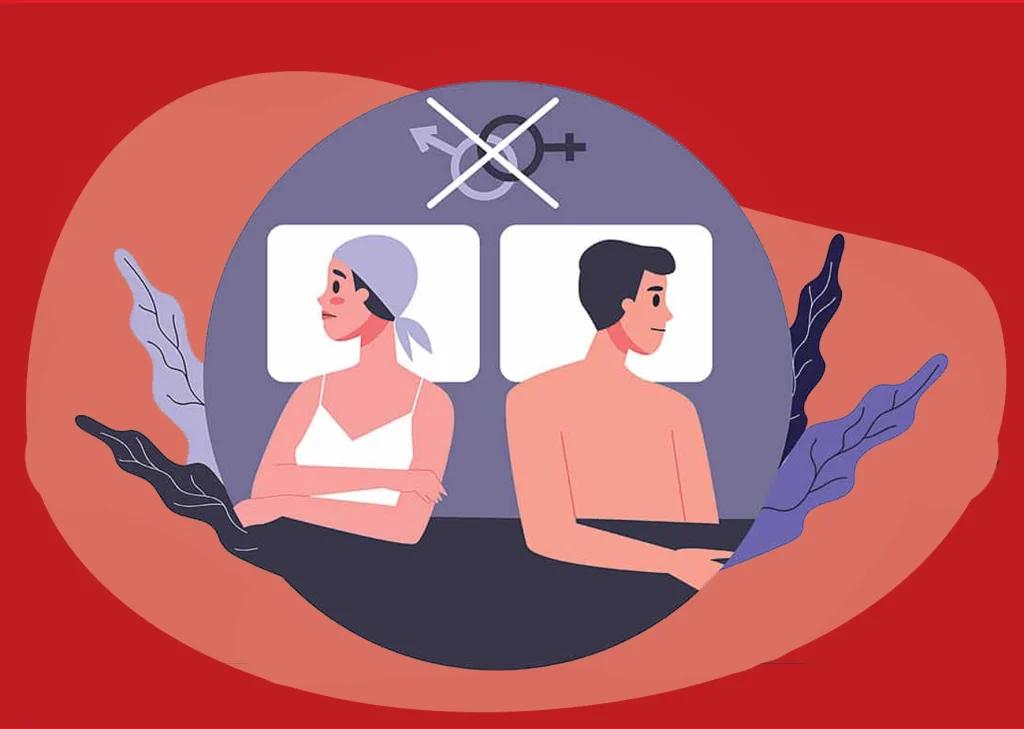A common problem that can happen to people at any age is low libido, or a loss of interest in sexual action. There are many things that can cause it, such as physical, mental, and lifestyle issues. People can deal with the problem and improve their quality of life by learning about the causes, recognizing the signs, and looking into effective treatments.
Table of Contents
ToggleCauses of Low Libido
1. Hormonal Imbalances
Such differences can happen during enrichment or declining hormonal levels of the androgens like testosterone or the estrogens. During the development of these alterations, low libido originates quite frequently. Certain medical conditions, among them hypothyroidism and polycystic ovary syndrome (PCOS), It may affect the hormonal levels and thereby cause low sex drive.
2. Chronic Illness
Long-term health problems like diabetes, heart disease, or chronic pain can make you feel tired and less interested in closeness.
Autoimmune diseases make you tired or uncomfortable and may play a part in the decrease of libido.
3. Medications
Antidepressants, blood pressure medicines, or hormonal birth control treatments may lower sexual desire.
Medicine alterations or dose adjustments can help increase sexual drive.
4. Fatigue
Being tired all the time, whether from not getting enough sleep, working too much, or having to care for kids, can make you less sexually interested.
Not getting enough rest lowers your general energy, which makes being close less appealing.
5. Stress and Anxiety
Stress from work, relationships, or problems in life can make people lose their sexual interest over time.
Anxiety, whether it’s about something in general or about a performance, can make desire even lower.
6. Depression
Depression is characterized by a low mood and a lack of drive, which can make people less interested in intimacy.
Medications for sadness can also make the problem worse.
7. Past Trauma
Physical or emotional stress, like being abused or having a bad sexual experience in the past, can make it hard to get close to someone for a long time.
Unresolved mental or emotional issues often need therapy to help a person get better.
8. Relationship Issues
Relationship problems and a loss of sexual interest can be caused by emotional distance, not talking to your partner enough, or unsolved arguments.
Sexual desires that don’t match up or standards that aren’t met can also make people angry and make them avoid intimacy.
9. Lifestyle Factors
Not getting enough sleep, not working out, and eating poorly can all lower your energy and hormone output.
Abusing drugs or drinking too much can make it harder to be sexual and lower your libido.
More Topics: Is Erectile Dysfunction Medicine Effective?
Symptoms of Low Libido
Treatment for Low Libido
Medical Interventions
- Hormone treatment
Taking testosterone or estrogen to ‘even out’ one’s hormones might help increase sexual drive.
- Switching the Meds
Maybe if it’s the medications that are bringing your libido down, you can take them up, either by changing them or following what your doctor says.
- Treating the Real Problems
Providing care for underlying health conditions or diseases seems to have the effect of making an individual feel more optimal and increasing libido.
Psychological Support
- Psychotherapy or counseling
Therapy for individuals and couples that could suffice treatment can take care of the mental issues so that they could have the luxury of talking with each other and help heal scars from old wounds.
- Methods of Stress Management
Techniques that include mindfulness, meditation, and relaxation routines help manage stress and get into smooth sexual gear.
Lifestyle Changes
- Regular exercise
Being active gives you more energy, makes you happier, and improves blood flow, all of which are good for your libido.
- Healthy meal
A well-balanced meal full of nutrients helps your body make hormones and energy.
- Adequate Sleep
Getting enough good sleep is important for both physical and mental health, which can increase sexual drive.
- Less drug use
Cutting down on drinking and recreational drugs can boost libido and sexual function.
Relationship Enhancement
- Being vocal
Sharing wants, fears, and what appeals builds intimacy and fosters connections with others.
- Quality mingling
Having time, which is quality to spend with each other, recreates the emotional bond and may lead to getting back your intimacy as well.
- Venturing into new experiences
Trying new activities or methods of relating could get that excitement back in the partnership.
More Topics: Free Guide of Preventing Erectile Dysfunction
Conclusion
Frequently Asked Questions
How can stress affect libido?
Stress chemicals justly decreased libido, making intimacy unappealing. Relaxation could be the way to handle stress.
Is low libido treatable?
Hormone therapy, counseling, lifestyle modifications, and treating underlying health issues work.
Which are the drugs used in various diseases that affect libido?
Antidepressants and blood pressure medicines might lower libido. A doctor may suggest combination therapy, dosage adjustment and switching to medicines with fewer sexual side effects.
How does sleep affect sex drive?
When a person sleeps less, it lowers his or her energy and hormone levels. This also reduces sexual interest. It is important to get an adequate amount of good sleep to have better sexual desire.
Can couples fix mismatched libidos?
By discussing sexual desire discrepancies, going to treatment, and compromising, couples can resolve them.
Can low libido indicate a major illness?
Periodically. A persistently low libido may indicate a medical issue such as diabetes, thyroid issues, or depression.

